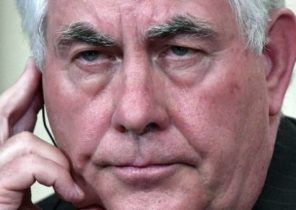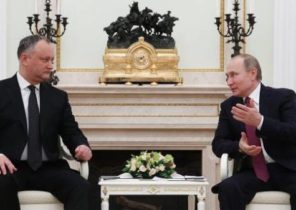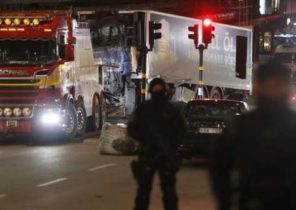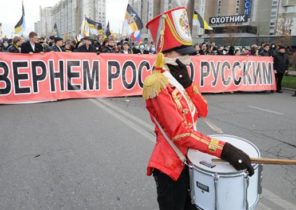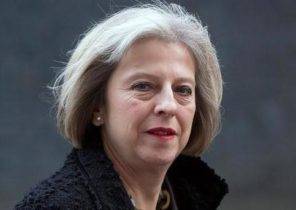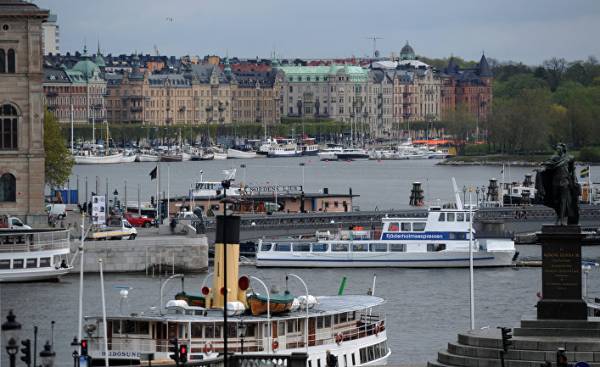
Study in Saint-Petersburg in the middle of 1990-ies and the fall of the Berlin wall became the basis of the first detective Martin Asterdale (Martin Österdahl) “O mercy, don’t ask” (Be inte om nåd).
Behind Martin Asterdale a long successful career in various media companies, including at Sveriges Television (Swedish television), where he is in 2008-2014 she worked as head of entertainment and sports programs, and in this capacity promoted the now popular format gear like the show “Master of masters” (Mästarnas mästare) and “Skavlan” (Skavlan).
Some period he was also head of programmes and projects, and in addition the producer of the music competition Melodifestivalen (2007 and 2008) and Eurovision in Malmo in 2013 and Stockholm in 2016.
In addition to working for food, he had a desire to start writing.
Some time ago Martin Osterdal began to devote all his time to writing a series of novels in the spirit of Thriller, deals with the complex relations between Russia and Sweden.
Six months ago I published the first part of the future trilogy with combat swimmer and expert on Russia max Unger (Max Anger) in the center of the story, and this summer released the second part of the series.
The cold war and the threat from the East
Martin Osterdal says that many were surprised when he several years ago started writing her first book that unfolds during the cold war, and which raises the question of the fear of the threat from the East.
“At that time of great interest in these matters was not, and it seemed, perhaps, somewhat outdated. People are more interested in other types of detective stories, like terrorism and Islamist threats. But suddenly the Russian question once again became the cutting, not least because of all those troops who recently posted on Gotland as protection from the Russian threat”.
Martin Osterdal, however, concerned, that seems to have no significant dialogue or even the desire to establish communication between Russia and Sweden, no:
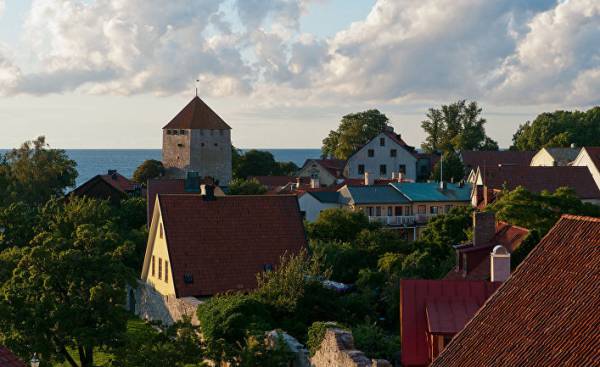 © flickr.com, JumillaВисбю, the main city of the Swedish island of Gotland
© flickr.com, JumillaВисбю, the main city of the Swedish island of Gotland
“It amazes me that the exchange between our countries and our peoples have always been incredibly small. In Russia laugh at the news on Swedish television, saying that Russia plans to seize Gotland. The Russians, with whom I communicated, say that this is absurd: Russia is the biggest country in the world that them more square miles?”
Russia at the crossroads
A debut action Thriller Martin Asterdale “O mercy, don’t ask” set in two time plans, on the one hand in the spring of 1996, and the other during the second world war, from summer 1943 to spring 1944.
In terms of the present time we are in February-March 1996, where Russia is at a crossroads and people must choose the President and many are wondering whether the re-elected incumbent President Boris Yeltsin, or a coup to have the Supreme power in the country will smile to rival Gennady Zyuganov and his retrocommunity.
“The reason that I decided to start my story in the spring of 1996, was the fact that I myself was then in the country. I studied at the University in Saint-Petersburg and then wrote a diploma. And although the spring was an important time of change, for both Russian and European history of this period is written not so much.
Presidential elections in Russia in 1996 was the first real election after the collapse of the Soviet Union. Boris Yeltsin ruled the largest country in the world from December 1991 and over the years became more and more unpredictable and was drunk during the state visit to Ireland he was barely able to get out of the plane, and even saw him in his underpants on Pennsylvania Avenue in Washington, when he tried to stop a taxi, to order a pizza…
Boris Yeltsin had completely written off and everyone thought that will choose the leader of the old Communist party of Zyuganov and Russia will return to some form of Communist rule, but something prevented, and Yeltsin managed to stay in power.
The forces of evil, which is all good
In the center of the story “for mercy don’t ask” is Max Unger, who works for the Swedish analytical center “Vector”, whose offices are located in Stockholm and in St. Petersburg.
Analytical center “Vector” working with the security policy, and its tasks include activities to improve safety in the adjacent regions of Sweden. The main focus is directed on support of democratic development in Russia.
One day a colleague and lover max Pasha Kovalenko (Kovalenko Pashie) disappears.
Pasha has long been engaged in the Cathedral, information about the number of private firms and the ongoing political campaigns to figure out who supports whom ahead of the upcoming elections.
Apparently, someone feels unsafe and is not shy any means to clean up the law.
“In the process of investigating Pasha on the trail of the evil forces who want to prevent Russia to follow the path of openness and democracy and seek to close it again. These forces most want to install some sort of Stalinist totalitarian regime,” says Martin Osterdal.
The protagonist max Unger military education, and he served in the war in Bosnia. He experienced a lot and gained experience which has provided him with great strength of spirit, but at the same time have left their traces in the form of panic attacks, which he tries to keep in check with antidepressants.
In the course of events we also learn of what Max found out the investigation on the history of his own family story, full of secrets, plunges us into the world of espionage and a well-guarded state secrets.
I wonder what drives max to his work on behalf of truth and justice — whether it is anger, which reminds us of the English “anger” in his name, or something else?
According to Martin Esterday, and max Unger, and his girlfriend, Pasha is driven by the desire to resist the forces that prevent people from living freely:
“And Max, Pasha, and everyone denied knowledge of the origin of his family. Max grew up on a small island on the edge of the Stockholm archipelago Arholma, and it was a great mystery as his family got there.
Max’s father came to the island as a foster child, and lives with his grandparents too murky. His father died under mysterious circumstances, when max was 12, and when the later died and his mother, he was released from his promise not to delve into the past”.
The bombing of Stockholm in 1944 — the mystery of the
During the second world war, the Swedish army was the secret construction of coastal defense on the Arholma and the investigation of max Unger draws it gradually to the Central events of 1943-44, with which is associated the story of his family — including several bombings of Stockholm Soviet fighters in February 1944.
“When I heard about the bombing, I was extremely amazed and interested. Even in Sweden, it seems that few people know about these developments. After all, our history since the second world war was held under the symbol of “the Swedish tiger” with yellow-blue stripes (say it in Swedish “en svensk tiger” means both “a Swedish tiger” and “a Swede is silent”, this image used the Swedish Ministry of foreign Affairs of those times — approx. transl.).
This motto reflects how the Swedes while low bowed his head and remained silent. Power game bypassed Sweden and Stockholm, and the Swedish government has considered it its most important task is always to preserve peace and to prevent the participation of Sweden in the war.”
The official explanation of why Stockholm was bombed, was a navigational error, in this version the bomb actually was designed for purposes in Finland.
But there is another explanation, according to which the attack was part of campaign designed to force Sweden to release a captured Soviet spy who was in prison on charges of espionage against the Kingdom of Sweden. A few days after the attack, Soviet spy was released.
Espionage runs like a red thread throughout the story “for mercy don’t ask” from a military espionage 1943-44 to modern espionage in 1996.
Pasha Kovalenko stood on the trail of Russian telecommunication enterprise, which is committed to bring down the Swedish telecommunications system and thus jeopardize the security of the Swedish state.
“Communication with industrial espionage or sabotage in some sense much more relevant now than when I started writing my book, says Martin Osterdal — Now you can enter in different information systems remotely to, for example, to influence the elections in any country.
Recently, moreover, inexplicable attacks on the telephone network in Sweden or on the control tower at Arlanda airport. Suddenly, everything just cuts off for a few hours. We don’t know whether these are funded attack by the state, whether controlled from the Kremlin or is it the result of the activities of organized crime, or maybe a combination of both, but we know that this is the case and that this could have serious consequences.”
Svenska Yle: How war is waged today?
Martin Osterdal: In one place the book says that now don’t attack another country with tanks, and “attack the aorta, which feeds the system with blood and oxygen, money and information.”
Martin Osterdal says, the idea that no more armies and soldiers in the trenches, but in very different ways the war is waged, scary.
In modern warfare and coveted prey looks a little different than square miles of land.
“It is difficult to understand what the threat is, how it looks and how to protect themselves. In Sweden we have now is somewhat outdated defense, and new times require that we totally revised”.
As an example, Martin cites Asterdale pipeline “Nord stream”, which lay on the Baltic sea.
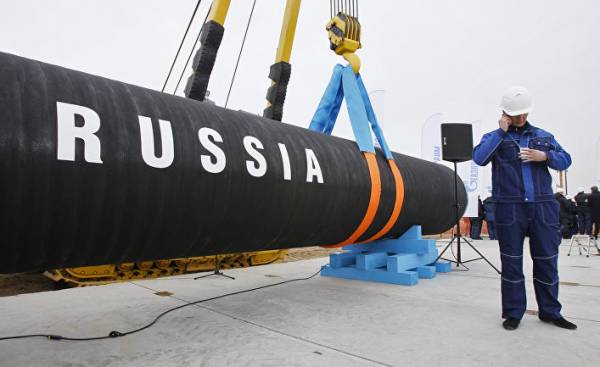 © AP Photo, Dmitry Lovetsky, fileПеред the beginning of solemn ceremony, devoted to beginning of construction of the gas pipeline “Nord stream”
© AP Photo, Dmitry Lovetsky, fileПеред the beginning of solemn ceremony, devoted to beginning of construction of the gas pipeline “Nord stream”
“Nord stream is a Russian gas company, which mostly belongs to the Russian state. Work is conducted by divers, who also have the skills to lay explosives and to place radio transmitters and communications equipment for submarines on the seabed.
Now we have emancipated them at the bottom of the Baltic sea and access to ports of Gotland. We can be confident that we have placed on the seabed not only pipelines. It’s not just a question of Economics or ecology, this is highly also a question of security policy — where the pipeline passes, will be military border.
If you turn the fear into knowledge
Reading “for mercy don’t ask”, you can feel the great love of the Russian culture and music, but also the fear and horror of this huge country in the East — what is this fear?
“The interest that was awakened in me when I was a child, began with fear mixed with admiration. I grew up in Stockholm in the 1970-80 years, when every Monday at 15.00 over the city sounded the sound alert of the invasion.
Like many other children, I’m also a little afraid of this whole story of nuclear weapons. We lived during the arms race, when the superpowers, the Soviet Union and the United States, one button could start a third world war. At some time I was afraid, and the threat came from the East, from the Soviet Union, not the United States.”
Martin Osterdal says that one way to overcome your fear for him was gaining knowledge:
“My curiosity was largely due to the fact that I felt compelled to try to understand what the fear.
Since childhood, Martin Osterdal was so musically gifted and went to the music school of Adolf Fredrik and sang in the children’s and youth chorus of the Royal Opera.
Thanks to the glee club, Martin Osterdal several times with the choir traveled to different States in the East and the Soviet Union.
“Because of my interest in music I have had the opportunity and privilege to go behind the iron curtain and to feel like there it was at the time. It was incredibly exciting to go to Budapest, Prague or St. Petersburg and to meet these friendly, beautiful and cheerful people who were described as “enemies of the open Western society.”
And I was amazed how we, in Sweden, the whole story managed to be inveterate enemies. Then I realized that in order to truly understand how this could happen, I have to study the history of Central Europe and to learn a little Russian. The collapse of the Soviet Union and the fall of the Berlin wall for me — the most significant event during my life.”
Mystery, in which intertwine history and politics
According to theater critic for the newspaper Svenska Dagbladet Lars of the Ring (Lars Ring), the effect of modern Swedish detectives takes place increasingly within the framework of everyday situations, instead be based on social issues, and revolve “around the psychoses of pregnant women and divorce instead of murder, crime and violence as outcomes of social imperfections”, as he expressed in an article in Svenska Dagbladet on 18 April.
The book Martin Asterdale about the analytical centre “Vector” and combat diver Max Unger, on the contrary, complex and multi-layered plot in which one of an intricate tangle of closely interwoven history, politics and community development.
I’m asking did he, an aspiring mystery writer, about which profile he chooses what to write and for whom?
“Of course, I thought about what you want to write such books that I like to read entertaining stories in living the plot, which has a deeper subtext, and historical information that I would be interested to know, to feel a little smarter afterwards. Stories that made me want to find out more. I like it when the stakes are high (stakes are high) and when the story revolves not only around a woman who was killed in the forest and finding who killed her; I prefer that there was some social and global level.
In summer comes the second part of a planned trilogy about Max Unger, and Martin Osterdal says that “Ten Swedes must die” (Tio svenskar måste dö) will take us into the year 2000, when Vladimir Putin elected President of Russia.
“In August 2000 was something that contributed to the end of the period of openness that have characterized Russia since the early 1990-ies. When the nuclear submarine “Kursk” ran aground in the Arctic ocean, the cold war suddenly came back again. When the Western powers offered Russia and Putin help with the lifting of the sailors who are stuck in an iron box in the depths of the sea without oxygen, Putin refused and showed his hard cold-blooded side, which continues to show and still.
We can say that the accident with the “Kursk” had Putin and his style of government. This is the starting point of the plot of my Thriller, much of which develops in Stockholm, which happens to be a number of notable assassinations of high-ranking officials, while the “Kursk” stranded in the Arctic ocean, and the only one who sees a connection between these events, of course, Max Unger,” says Martin Osterdal with a mysterious smile.

